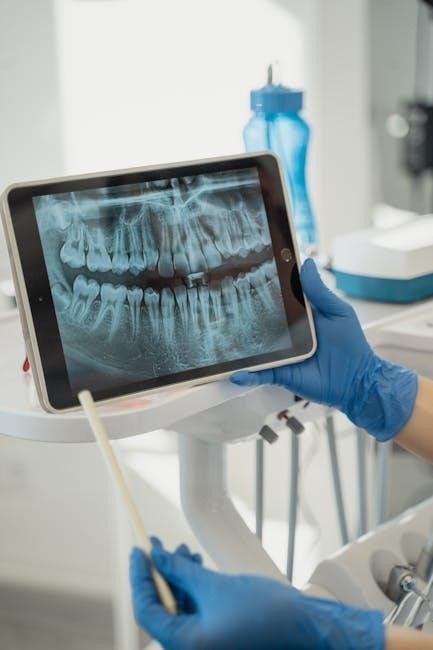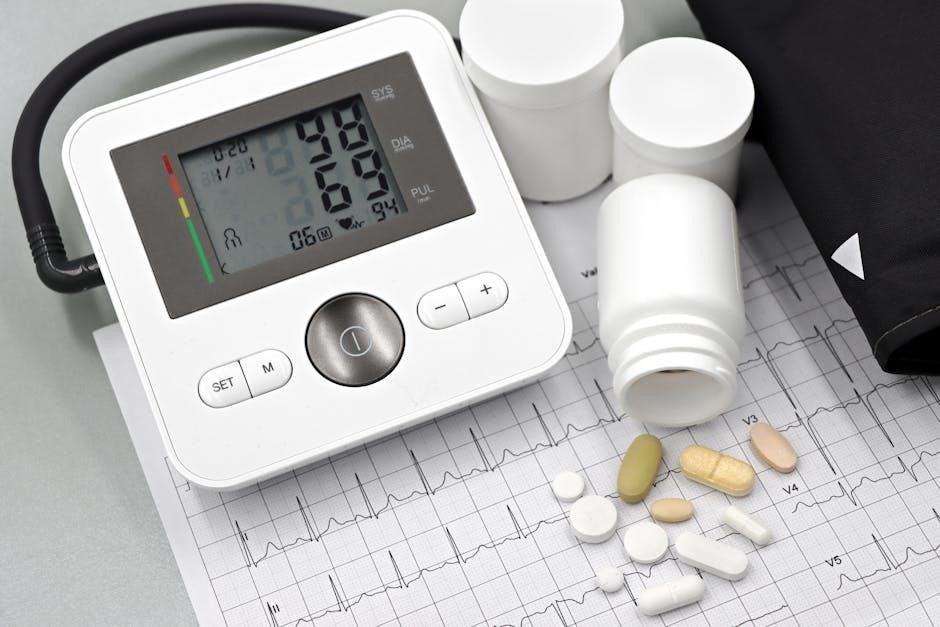Medication administration exams are crucial for assessing nurses’ knowledge and competence․ Multiple choice questions cover key concepts‚ ensuring safe and accurate drug delivery․ PDF resources provide accessible study materials‚ aiding in thorough preparation and helping identify knowledge gaps for improvement․
1․1 Importance of Medication Administration in Healthcare
Medication administration is a critical component of healthcare‚ ensuring patients receive the right treatment safely and effectively․ It directly impacts patient outcomes‚ preventing complications and improving quality of life․ Accurate drug delivery minimizes errors‚ which can lead to adverse reactions or therapeutic failures․ Proper technique and adherence to the six rights of medication administration—right patient‚ right drug‚ right dose‚ right route‚ right time‚ and right documentation—are essential․ Nurses play a vital role in this process‚ requiring strong knowledge and skills․ Effective medication administration enhances patient safety‚ optimizes therapy‚ and supports overall healthcare goals․ Education and resources‚ such as multiple choice exams and PDF guides‚ are key to mastering these skills․
1․2 Purpose of Multiple Choice Exams in Nursing Education
Multiple choice exams are a fundamental tool in nursing education‚ assessing knowledge and critical thinking skills․ These exams simulate real-world scenarios‚ preparing nurses for clinical challenges․ They evaluate understanding of key concepts‚ such as medication administration‚ ensuring competence in patient care․ The structured format allows educators to cover a broad range of topics‚ from drug dosages to administration routes․ Instant feedback from these exams helps identify areas needing improvement․ Additionally‚ PDF resources offering practice questions and answers provide accessible study materials․ Regular testing enhances retention and application of knowledge‚ ultimately improving patient safety and care quality․ This method is essential for developing confident‚ skilled healthcare professionals;
1․3 Benefits of Using PDF Resources for Exam Preparation
PDF resources are invaluable for exam preparation due to their accessibility and convenience․ They provide comprehensive study guides‚ practice questions‚ and detailed answer explanations․ Nurses can access these materials anytime‚ anywhere‚ facilitating self-paced learning․ PDFs often include mock exams and flashcards‚ simulating real test environments and enhancing exam readiness․ Their portability allows for easy reference during commutes or breaks․ Additionally‚ PDFs are cost-effective and environmentally friendly compared to printed materials․ Regular use of these resources helps identify knowledge gaps‚ improve retention‚ and build confidence․ Overall‚ PDF resources are a practical and efficient tool for successful exam preparation in medication administration․

Key Concepts in Medication Administration
Understanding the six rights of medication administration is essential for ensuring patient safety and accurate drug delivery․ They include right patient‚ medication‚ dose‚ route‚ time‚ and documentation․
2․1 The Six Rights of Medication Administration
The six rights of medication administration are a cornerstone of patient safety‚ ensuring drugs are given safely and effectively․ Right patient involves verifying identity to prevent mix-ups․ Right medication ensures the correct drug is administered‚ aligning with the prescription․ Right dose confirms the prescribed amount‚ avoiding underdose or overdose risks․ Right route specifies the correct method of administration‚ such as oral or intravenous․ Right time ensures medication is given at the appropriate interval․ Finally‚ right documentation involves accurately recording administration details for accountability and continuity of care․ These principles minimize errors and enhance patient outcomes․
2․2 Common Medication Errors and How to Avoid Them
Medication errors‚ such as incorrect dosages or wrong routes‚ can lead to serious patient harm․ Common errors include misreading prescriptions‚ miscalculating doses‚ and distractions during administration․ To avoid these‚ nurses should double-check medication orders and use tools like barcode scanning․ Minimizing interruptions during preparation and administration is crucial․ Proper training and adherence to the six rights of medication administration are essential․ Additionally‚ clear communication with healthcare teams and patients reduces error risks․ Implementing these strategies enhances patient safety and ensures accurate drug delivery․ Regular education and updated protocols further mitigate potential mistakes in medication administration․
2․3 Routes of Medication Administration

Understanding the various routes of medication administration is essential for safe and effective drug delivery․ Common routes include oral‚ intravenous‚ intramuscular‚ subcutaneous‚ and rectal․ Each route has specific advantages and considerations․ For instance‚ oral administration is non-invasive but may be affected by digestion‚ while intravenous delivery offers rapid action but requires precise technique․ Intramuscular injections are ideal for medications needing slow absorption‚ and subcutaneous injections are often used for self-administration․ Rectal administration is useful for patients with swallowing difficulties․ Knowledge of these routes ensures appropriate drug absorption and effectiveness‚ critical for patient care and safety․
2․4 Special Considerations in Pediatric and Geriatric Medication Administration
Pediatric and geriatric populations require tailored approaches to medication administration․ Children often need age-specific dosing‚ as their bodies metabolize drugs differently․ Geriatric patients may have reduced renal function‚ necessitating dose adjustments․ Both groups are more susceptible to adverse effects due to physiological changes․ For pediatric patients‚ ensuring proper formulation (e․g․‚ liquid vs․ tablets) is crucial․ Geriatric patients may face challenges with polypharmacy‚ requiring careful review of medications to prevent interactions․ Nurses must also consider cognitive and physical limitations‚ such as difficulty swallowing in the elderly or administration challenges in infants․ Tailored strategies enhance safety and efficacy in these vulnerable populations‚ ensuring optimal care․
Exam Strategies and Tips
Effective strategies include time management‚ prioritizing high-weight questions‚ and using elimination techniques to improve accuracy․ Reviewing answers and utilizing PDF study resources enhance preparation and confidence․
3․1 Effective Study Techniques for Multiple Choice Exams
Effective study techniques for multiple choice exams involve active recall‚ spaced repetition‚ and focused practice․ Use flashcards to reinforce key concepts like the six rights of medication administration․ Practice with timed mock exams to simulate exam conditions and improve time management․ Review incorrect answers to identify knowledge gaps and strengthen understanding․ Organize study groups to discuss challenging topics and gain diverse perspectives․ Utilize PDF study guides and question banks to access a wide range of practice questions․ Prioritize high-yield topics‚ such as common medication errors and routes of administration‚ to maximize study efficiency․ Consistent practice and thorough review are essential for achieving mastery․
3․2 Time Management During the Exam
Effective time management is critical during multiple choice exams to ensure all questions are addressed․ Allocate time evenly‚ typically 1-2 minutes per question‚ depending on exam length․ Start with easier questions to secure early points‚ then return to challenging ones․ Avoid spending too long on a single question‚ as it may compromise completing the exam․ Skim through answer choices to identify obvious distractors and eliminate incorrect options․ Use process of elimination to narrow down answers when uncertain․ Keep track of time using a watch or timer provided․ Prioritize questions with higher confidence first to maximize scoring efficiency․ Stay calm and focused to maintain clarity and avoid rushing․
3․3 How to Analyze and Answer Questions Correctly
To analyze and answer questions correctly‚ start by reading each question thoroughly‚ identifying key terms and what is being asked․ Skim the answer choices to quickly eliminate obviously incorrect options․ Consider the context of the question‚ such as patient-specific scenarios or medication administration principles․ Use knowledge of the six rights of medication administration to guide your reasoning․ Avoid distractors designed to test comprehension․ If unsure‚ use the process of elimination to narrow down choices․ Trust your first instinct unless a clear reason to doubt it arises․ Stay focused and avoid overcomplicating the question․ This systematic approach enhances accuracy and confidence in selecting the correct answer․

Legal and Ethical Aspects of Medication Administration
Understanding legal policies and ethical principles ensures safe‚ responsible medication administration․ Nurses must adhere to confidentiality‚ document accurately‚ and recognize implications of errors to maintain patient trust and compliance․
4․1 Understanding Medication Administration Policies
Medication administration policies are essential for ensuring safe and legal drug delivery․ These policies outline clear procedures for verifying orders‚ preparing medications‚ and documenting administration․ Nurses must familiarize themselves with institutional guidelines and regulatory standards to minimize risks and maintain accountability․ Compliance with these policies helps prevent errors and protects both patients and healthcare providers․ Regular updates and training on medication administration policies are crucial to stay informed about best practices and legal requirements․ Adhering to these guidelines fosters a culture of safety and ethical care‚ ensuring that medication administration remains a priority in patient treatment plans․
4․2 Role of Confidentiality in Medication Administration
Confidentiality is a critical aspect of medication administration‚ ensuring patient privacy and trust․ Nurses must adhere to legal and ethical standards‚ such as HIPAA‚ to protect patient health information․ Access to medication records should be restricted to authorized personnel only․ Discussing patient details in secure settings and avoiding disclosure to unauthorized individuals are vital․ Breaches of confidentiality can lead to legal consequences and loss of patient trust․ Maintaining confidentiality fosters a respectful and professional environment‚ emphasizing the nurse’s role as a patient advocate․ This principle is fundamental in building strong patient-provider relationships and upholding ethical healthcare practices․
4․3 Legal Implications of Medication Errors
Medication errors can lead to serious legal consequences‚ including lawsuits and negligence claims․ Nurses and healthcare institutions may face legal actions if errors result in patient harm․ Proper documentation and adherence to protocols are crucial‚ as they serve as evidence in legal proceedings․ Breaches of legal standards‚ such as failure to follow medication administration policies‚ can lead to liability․ In severe cases‚ criminal charges may apply if errors involve reckless behavior․ Understanding legal implications is essential for nurses to ensure compliance with regulations and maintain patient safety‚ ultimately protecting both patients and healthcare providers from legal repercussions and fostering a culture of accountability․
Safety in Medication Administration
Safety in medication administration involves strict protocols to minimize errors․ High-alert medications require extra precautions‚ and technology‚ like barcode scanning‚ enhances accuracy․ Proper documentation and reporting of adverse reactions are critical to ensuring patient safety and preventing harm․
5․1 High-Alert Medications and Safety Measures
High-alert medications‚ such as opioids and anticoagulants‚ pose significant risks due to their potential for causing harm if errors occur․ To ensure safe administration‚ healthcare providers must implement strict safety measures․ These include double-checking prescriptions‚ using barcode scanning systems‚ and limiting access to these medications․ Additionally‚ staff should be trained to recognize potential errors and report them immediately․ Regular audits and the use of automated dispensing systems can further reduce risks․ Patient monitoring is also crucial‚ especially for medications with narrow therapeutic indexes․ By adhering to these protocols‚ healthcare teams can minimize adverse events and improve patient outcomes․
5․2 Use of Technology to Enhance Medication Safety
Technology plays a pivotal role in enhancing medication safety by reducing errors and improving efficiency․ Electronic Health Records (EHRs) and e-prescription systems minimize handwriting errors‚ while barcode scanning ensures the right medication is administered to the right patient․ Automated dispensing cabinets control access to high-risk medications‚ and clinical decision-support systems alert healthcare providers to potential drug interactions or allergic reactions․ Additionally‚ wearable devices and mobile apps can monitor medication adherence and send reminders to patients․ These tools‚ when integrated into clinical workflows‚ significantly enhance patient safety and streamline medication administration processes in healthcare settings․
5․3 Reporting and Documenting Adverse Drug Reactions
Accurate reporting and documentation of adverse drug reactions (ADRs) are critical for ensuring patient safety and improving future care․ Healthcare providers must promptly report any unexpected or harmful reactions to medications using standardized forms or electronic systems․ Documentation should include detailed patient information‚ medication names‚ dosages‚ and the nature of the reaction․ This data helps identify patterns‚ prevents future incidents‚ and informs pharmacovigilance efforts․ Confidentiality must be maintained while ensuring transparency in reporting․ Proper documentation also aids in legal compliance and continuous quality improvement in healthcare settings․ Regular training and updates for staff on ADR reporting protocols are essential to enhance medication safety and patient outcomes․

Patient Education and Communication
Patient education is vital for safe medication use․ Clear communication ensures understanding of dosages‚ side effects‚ and administration methods․ Nurses play a key role in providing accurate information and addressing patient concerns effectively․
6․1 Importance of Patient Education in Medication Administration
Patient education is critical for ensuring safe and effective medication use․ It empowers individuals to manage their health‚ reducing errors and enhancing adherence․ Clear communication by healthcare providers about dosages‚ side effects‚ and administration methods minimizes risks․ Educated patients are more likely to follow treatment plans‚ improving outcomes and reducing hospital readmissions․ Nurses play a pivotal role in this process‚ tailoring information to meet individual needs and addressing concerns promptly․ Effective education also fosters trust and collaboration between patients and healthcare teams‚ ultimately promoting better health management and safety․
6․2 Communicating Medication Instructions Effectively
Effective communication of medication instructions is essential for patient safety and adherence․ Nurses should provide clear‚ concise‚ and easy-to-understand information‚ avoiding medical jargon․ Using visual aids like pill cards or demonstration can enhance comprehension․ Verifying patient understanding through “teach-back” methods ensures accuracy․ Tailoring instructions to individual needs‚ such as language preferences or literacy levels‚ improves effectiveness․ Additionally‚ highlighting key points like dosage‚ frequency‚ and potential side effects helps patients remember critical details․ Follow-up discussions and written summaries reinforce instructions‚ empowering patients to manage their medications confidently and safely․ Clear communication reduces errors and promotes positive health outcomes․
6․3 Addressing Patient Concerns and Questions
Addressing patient concerns and questions is vital for ensuring safe and effective medication administration․ Nurses should listen actively‚ provide clear explanations‚ and reassure patients to alleviate fears․ Encouraging patients to ask questions fosters trust and understanding․ It’s important to address concerns about side effects‚ dosage‚ or interactions with other medications․ Cultural and language barriers should be considered‚ with interpreter services available if needed․ Patients should be empowered to make informed decisions about their care․ Summarizing discussions and offering written information can reinforce understanding․ Regular follow-ups ensure ongoing concerns are addressed‚ promoting adherence and positive health outcomes․ Open communication builds patient confidence and trust in their care team․

Advanced Topics in Medication Administration
Advanced topics include medication administration in critical care‚ managing allergies‚ and integrating herbal therapies․ These complex scenarios require precise knowledge and skill to ensure patient safety and optimal outcomes․
7․1 Medication Administration in Critical Care Settings

Critical care settings require precise medication administration due to high-stakes patient conditions․ Nurses must manage high-alert medications‚ ensuring accurate dosing and continuous monitoring․ Titration of vasoactive drugs‚ rapid medication adjustments‚ and use of advanced technologies like smart infusion pumps are common․ Patient-specific factors‚ such as renal or hepatic impairment‚ complicate dosing․ Strict adherence to protocols and real-time collaboration with healthcare teams are essential․ Multiple-choice exams often include scenarios addressing these challenges‚ testing knowledge of critical care pharmacology and prioritization skills․ PDF resources provide case-based practice questions‚ helping nurses master these complex situations and improve patient outcomes in intensive care environments․
7․2 Management of Medication Allergies and Sensitivities
Identifying and managing medication allergies and sensitivities is critical to prevent adverse reactions․ Nurses must assess patients for known allergies‚ document them clearly‚ and ensure medications are cross-checked for potential allergens․ Symptoms of allergic reactions‚ such as rash‚ itching‚ or respiratory distress‚ must be promptly recognized and reported․ Desensitization or alternative medications may be necessary․ High-risk medications‚ like antibiotics‚ often require special attention․ Multiple-choice exams frequently include questions on allergy management protocols‚ emphasizing patient safety and accurate documentation․ PDF resources provide detailed scenarios and answers‚ helping nurses master these critical care strategies and reduce risks associated with medication administration․
7․3 Use of Herbal and Alternative Medications
Nurses must consider herbal and alternative medications when administering treatments‚ as these can interact with prescribed drugs․ Many patients use supplements like St․ John’s Wort or ginkgo‚ which can cause adverse effects․ Nurses should inquire about these during patient assessments and document findings․ Multiple-choice exams often test knowledge on potential herb-drug interactions and their implications․ For instance‚ certain herbs can enhance or inhibit the effects of medications‚ leading to toxicity or reduced efficacy․ PDF study guides provide case studies and answers‚ helping nurses understand safe practices and communicate effectively with patients about these often overlooked aspects of medication administration․

Resources for Exam Preparation
Recommended textbooks‚ online platforms‚ and study guides provide comprehensive practice questions and answers․ Flashcards and simulated exams enhance preparation‚ helping nurses master medication administration concepts efficiently․
8․1 Recommended Textbooks and Study Guides
Textbooks like Pharmacology and the Nursing Process and Medications: The Comprehensive Guide are highly recommended for exam preparation․ These resources provide detailed explanations of drug therapies‚ administration routes‚ and potential side effects․ Study guides such as NCLEX-RN Medication Administration Review offer practice questions and case studies‚ simulating real exam scenarios․ Additionally‚ Medication Administration Made Incredibly Easy simplifies complex concepts with clear visuals and mnemonics․ These materials are essential for understanding key principles and preparing for multiple-choice exams; They also include answer keys and rationales‚ helping learners identify knowledge gaps and improve their understanding of safe medication practices․
8․2 Online Platforms for Medication Administration Practice Questions
Several online platforms offer practice questions for medication administration exams‚ enhancing preparation․ Quizlet provides flashcards and tests on drug calculations and administration routes․ Nursing․com features NCLEX-style questions with detailed rationales․ Khan Academy offers free practice exercises covering pharmacology basics․ ExamEdge and PracticeTestPlus supply realistic exam simulations‚ mirroring actual test formats․ These platforms allow learners to assess their knowledge‚ track progress‚ and focus on weak areas․ They also provide instant feedback and explanations‚ aiding in understanding complex concepts․ Utilizing these resources ensures nurses are well-prepared for certification and competency exams‚ boosting confidence and competence in medication administration․
8․3 Utilizing Flashcards and Simulated Exams
Flashcards and simulated exams are effective tools for exam preparation․ Flashcards help memorize key terms and concepts‚ such as drug names and administration routes․ Simulated exams mimic real test conditions‚ improving time management and reducing anxiety․ Platforms like Quizlet offer digital flashcards‚ while websites such as Nursing․com provide full-length practice exams․ These resources allow learners to identify knowledge gaps and reinforce understanding․ Regular use enhances retention and confidence‚ ensuring readiness for the actual exam․ Additionally‚ simulated exams often include detailed answer explanations‚ aiding in deeper comprehension of medication administration principles and practices․
Final Exam Preparation and Review
Final exam preparation involves reviewing key concepts and practicing with mock exams․ Utilize PDF resources for targeted study‚ focusing on weak areas identified through practice quizzes․ Ensure a thorough understanding of medication administration principles‚ and employ stress-reduction techniques to maintain confidence during the exam․
9․1 Conducting a Final Review of Key Concepts
Conducting a final review of key concepts is essential for exam success․ Focus on the six rights of medication administration‚ common errors‚ and routes of administration․ Use PDF study guides to revisit crucial topics and practice with sample questions․ Pay attention to high-alert medications‚ pediatric and geriatric considerations‚ and legal aspects․ Reviewing patient education strategies and safety measures will also reinforce understanding․ Organize study sessions to cover weak areas identified through practice exams․ Ensure familiarity with question formats and time management techniques․ Skim through flashcards for quick revision and apply learned strategies during mock tests to build confidence and accuracy․
9․2 Practicing with Full-Length Mock Exams
Practicing with full-length mock exams is a proven strategy to prepare for medication administration exams․ These exams simulate real test conditions‚ helping candidates assess their readiness․ By completing timed‚ 100-question exams‚ nurses can improve time management and reduce anxiety․ Mock exams also identify knowledge gaps‚ allowing focused study on weak areas․ Reviewing answer explanations enhances understanding and retention․ Utilize PDF resources and online platforms offering mock exams to familiarize yourself with question formats․ Track progress by retaking exams and analyzing improvements․ This method builds confidence and ensures a thorough grasp of key concepts‚ ultimately leading to better performance on the actual exam․
9;3 Managing Exam Day Stress and Anxiety
Managing exam day stress and anxiety is essential for optimal performance․ Ensure adequate rest‚ a nutritious meal‚ and arrive early to avoid last-minute rushes․ Practice deep breathing exercises to calm nerves and maintain hydration levels․ A positive mindset and brief review of notes can enhance confidence and reduce anxiety․ Familiarizing yourself with the exam environment minimizes unexpected stressors․ By implementing these strategies‚ you can maintain a composed and focused demeanor‚ ultimately leading to a successful exam experience․
